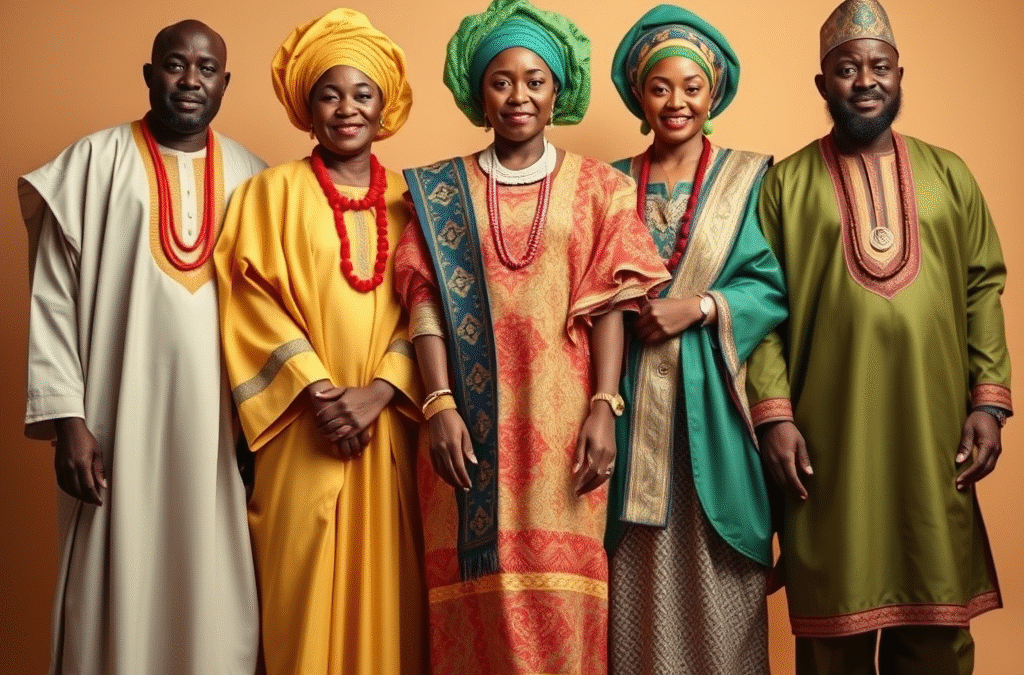Top Nigerian Traditional Dresses and Their Names
Nigeria, a country rich in cultural diversity, is home to over 250 ethnic groups, each with its own unique traditional attire. These dresses are not only a reflection of the people’s heritage but also an expression of their identity, status, and creativity. Here is an informative guide to some of the top traditional dresses in Nigeria and their names:
- Agbada (Yoruba)
The Agbada is a flowing, wide-sleeved robe worn by men, predominantly among the Yoruba people. It consists of three pieces: a large gown, a long-sleeved shirt, and trousers. Made from luxurious fabrics like aso-oke, lace, or damask, the Agbada is often embroidered with intricate patterns. It is worn during important ceremonies such as weddings, festivals, and chieftaincy titles. - Isiagu (Igbo)
The Isiagu is a traditional Igbo attire for men, resembling a shirt with lion head patterns embroidered on it. It is usually worn with trousers and a red cap called “Okpu Agu,” symbolising authority and respect. The Isiagu is commonly donned during significant occasions like traditional weddings, cultural festivals, and title-taking ceremonies. - Buba and Iro (Yoruba)
The Buba is a loose-fitting blouse worn by Yoruba women, paired with the Iro, a large wrapped skirt. Together, they form a graceful and elegant outfit. Women often complement the attire with a Gele (head tie) and Ipele (sash). These dresses are popular at social gatherings, weddings, and religious events. - Kaftan (Hausa/Fulani)
The Kaftan is a long, flowing robe worn by both men and women in Northern Nigeria, especially among the Hausa and Fulani people. Men typically wear it with matching trousers and a cap known as “Hula.” Women’s kaftans are often more elaborately decorated and paired with a hijab or headscarf. The Kaftan is favoured for its comfort and modesty. - George Wrapper (Cross River/Ibibio)
Among the Cross River and Ibibio people, the George wrapper is a luxurious fabric used to create elaborate traditional outfits for women. It is usually worn as a wrapper with a matching blouse and headgear. The fabric is often richly embroidered or adorned with beads, making it a popular choice for weddings and special ceremonies. - Etibo and Ikaki (Ijaw)
The Ijaw people traditionally wear the Etibo, a loose top, and the Ikaki, a wrapper or trousers. These garments are often made from colourful fabrics and accessorised with beads and coral jewellery. The attire is typically worn during festivals and community celebrations. - Senator Suit (Contemporary Traditional)
While not ethnic-specific, the Senator suit has become a popular traditional-inspired attire across Nigeria. It consists of a long top with a straight fit paired with trousers. It is favoured for its modern style combined with traditional fabric choices like Ankara, lace, or damask.
Conclusion
Nigeria’s traditional dresses are a vibrant tapestry of its cultural heritage. Each attire has its own story and significance, reflecting the diversity and unity of the Nigerian people. Whether it is the majestic Agbada, the elegant Buba and Iro, or the comfortable Kaftan, these traditional dresses continue to play a vital role in Nigeria’s social and cultural life. Embracing and celebrating these attire helps preserve the rich history and identity of Nigeria’s many ethnic groups.

